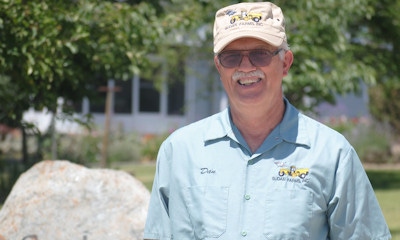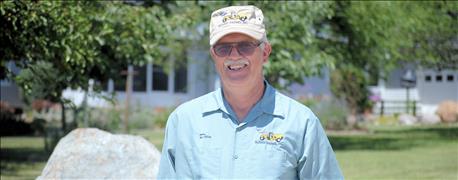
We reported recently that Katrina Hall, Indiana Farm Bureau’s director of legislative services, said one reason farmers got real tax relief in this session of the Indiana General Assembly was because so many farmers contacted their legislators. Randy Kron, Evansville, [president of Indiana Farm Bureau, agrees. He says legislators have told him personally that they got the point- farmers needed real property tax relief, not more of the same, and not even just ‘hold the line’ legislation. While the governor has yet to sign it, he is expected to do so shortly.

VALUE OF CONTACT: Dan Arnholt reinforces the concept that farmers reaching out to lawmakers can make a difference.
Dan Arnholt, Columbus, read the stories and responded. Dan, his wife Susan and son Clint are no-till farmers. Arnholt also completed a career in public electrical utilities, serving farmers interests. He’s an early graduate of the Indiana Agricultural Institute.
Dear editor:
I thought the article on contacting your legislators was a good one. I hope it was well read by your readers.
My comments were that typically production agriculture does not contact their legislators until there is an issue. They need to attend the third houses (local meetings), write or call when the legislator or Congressman supports something that is beneficial. By doing this a legislator or Congressmen gets to know the caller on a positive basis. If you think of your personal life, who do you have more confidence in when you need advice - someone who calls only when there is a problem, or someone who has touched base with you many times in the past in a positive manner? Establishing relationships ahead of issues (arising) will gain you more credibility when you do call.
At the national level, a small number of calls from voters help guide Congressmen in their decisions. Mass mailings help, but directed calls from voters have a huge impact. Years ago I happened to be in an Indiana Congressman’s office in Washington, D.C. when a very important issue was going to be voted on that day, and it had a lot of coverage from the national press. The legislative aide was keeping track of calls on the subject from constituents. The tally about 10 minutes before the vote was 10 for it and four against it.
I knew the aide well enough that I asked him what the Congressman was going to do. “Vote with the 10 calls,” he told me.
Lobbyists do a great job because they are experts in whatever field they are trying to convince the legislator to take action on. However, if a legislator receives the same message from a lobbyist or a constituent voter, the voter’s (opinion) will carry more weight in the decision-making process.
Keep encouraging positive active participation in the legislative contacts, rather than (contacts) only when issues arise. Agriculture needs all the good listeners we can get.
Dan J. Arnholt
About the Author(s)
You May Also Like




